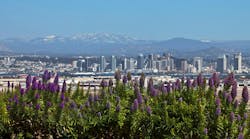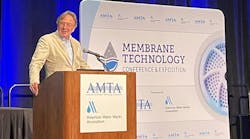NEWARK, NJ, Nov. 8, 2012 -- Hundreds of millions of gallons of untreated or partially treated wastewater have flowed into the state's waterways since Superstorm Sandy hit last week, creating what Gov. Chris Christie on Thursday called "a huge problem."
Most of the wastewater is coming from the crippled Passaic Valley Sewerage Commission system, which suffered power outages and flooding from Sandy, the state Department of Environmental Protection said. On Thursday, Christie's office and the DEP urged the 1.4 million residents in 48 towns served by the PVSC to restrict water use to reduce stress on the system.
Right after the storm, the PVSC system was releasing 500 million gallons of untreated wastewater and stormwater a day into Newark Bay, DEP spokesman Larry Hajna said. The PVSC, after restoring power and repairing some of the damage last weekend, has been pumping 250 million gallons of partially treated wastewater per day through its normal route into New York Harbor. Utilities aren't allowed to dump untreated or partially treated water into waterways unless an emergency exists, Hajna said.
The Middlesex County Utility Authority's wastewater treatment system also sustained damage and has been pumping about 65 million gallons of untreated wastewater per day into the Raritan River, MCUA executive director Richard Fitamant said Thursday. The DEP issued a water restriction advisory to the 38 towns and 797,000 customers of MCUA on Tuesday.
The superstorm, formed when Hurricane Sandy merged with two other weather systems, killed more than 100 people in 10 states but vented the worst of its fury on New York and New Jersey, where beach towns were flooded and power was knocked out to thousands of homes and businesses.
Christie said the flooding damage to the water treatment facilities was "profound."
"This is a huge problem, one of the biggest problems we've encountered after the hurricane," he said at a news conference Thursday.
Fitamant said the MCUA's wastewater treatment plant was undamaged because it is on high ground but pumping stations in Edison and Sayreville that feed the plant suffered severe flooding and had to have all their equipment removed. Fitamant said a bypass system was activated so that by Thursday the treatment plant was handling about 45 million gallons per day.
He expected the system to be able to treat its normal 110 million gallons per day by next week using an additional bypass system, but it could take weeks or months to get the system completely back to normal.
A spokesman for the Passaic Valley authority referred questions to the DEP.
Hajna said power was restored late last week to the PVSC system but floodwaters remained in the tunnels and had to be removed. Until that point the wastewater had been bypassing the treatment plant and flowing to the Newark Bay. When the tunnels were cleared over the weekend, wastewater could be partially processed and routed to New York Harbor, he said.
The DEP is monitoring drinking water that could be affected by the wastewater, which comes from business and household sinks, tubs and toilets, but no problems had been identified, Hajna said. Contact with the water or accidental ingestion could cause respiratory irritation or illness related to E. coli bacteria, for example, he said.
Christie said his office will review whether additional steps need to be taken to safeguard wastewater systems in the future.
###


